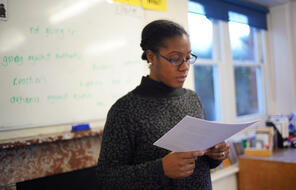Overcoming Fears and Spurring Action
At a Glance
Language
English — USSubject
- Civics & Citizenship
- Human & Civil Rights
- Democracy & Civic Engagement
Ambassador Samantha Power’s Remarks on the Global Refugee Crisis (excerpted)
US Institute of Peace, June 29, 2016
[L]ook around the country—look deeply—and you will find so many people who not only support admitting more refugees, but who themselves are making tremendous efforts to welcome them. People like the owners of Wankel’s Hardware Store in New York, where I live, which for decades has been employing recently resettled refugees, including 15 of their 20 current employees. Wankel’s keeps a map on the wall of the store with pins marking the 36 countries from which their refugee employees have come. Many Americans are doing their part and wish to find a way to do more.
When visiting the International Rescue Committee [IRC] resettlement office—just a 10-minute walk from the UN—recently, I noticed that many of their individual offices seemed to be overflowing with boxes. When I asked whether the folks who worked at IRC were moving in or moving out of the space, I was told that after some U.S. politicians threatened to curb the flow of refugees, the IRC had received a huge, unprecedented surge in donations. And they simply had no other space to store all the clothes, toys, and home furnishings that had come flooding in, just from ordinary people. A similar outpouring occurred inside the U.S. government. When we announced our goal to admit an additional 15,000 refugees this year, many U.S. national security professionals volunteered to take extra trainings and work extra hours in their already long days to help us meet that goal.
These examples abound. The small Vermont town of Rutland has committed to taking in 100 Syrian refugees. The mayor, whose grandfather came to the U.S. after fleeing war in his native Greece, said of the decision, “As much as I want to say it’s for compassionate reasons, I realize that there is not a vibrant, growing, successful community in the country right now that is not embracing new Americans.” Local schools are preparing to support kids who cannot [speak] English, and local businesses in Rutland have said that they will look to hire refugees. One of them is a regional medical center, whose director is the grandson of refugees from Nazi Germany. “I know there is a good-heartedness to this city,” he said. “If you come here and want to make the community better, Rutlanders will welcome you with open arms.” A poll some of you have seen that was released this month by the Brookings Institution suggests that most Americans feel the same way. Asked if they would support the U.S. taking in refugees from the Middle East after they were screened for security risks, 59 percent of Americans said yes. Yes. 1
- 1Excerpted from “Remarks on ‘The Global Refugee Crisis: Overcoming Fears and Spurring Action,’ at the U.S. Institute of Peace,” United States Mission to the United Nations website.
How to Cite This Reading
Facing History & Ourselves, "Overcoming Fears and Spurring Action," last updated May 12, 2020.













